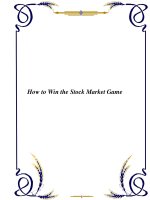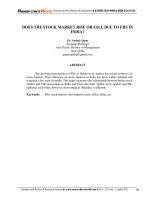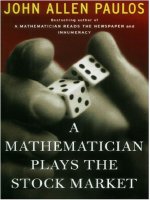The stock market
Bạn đang xem bản rút gọn của tài liệu. Xem và tải ngay bản đầy đủ của tài liệu tại đây (376.14 KB, 34 trang )
Chapter 16: The Stock Market
Overview
He that could know what would be dear need be a merchant but one year.
Proverb
[1]
Your stock market score could well determine the quality of your retirement. This chapter
does not attempt to provide an overview of the stock market, but rather it covers some
topics in finance that have game-theory-like qualities.
[1]
Browning (1989), 378.
Stock Market Commentators
How seriously should we take commentators who predict future stock price movements?
To figure this out, we first have to examine why anyone would widely disseminate his
stock picks.
Pretend a pirate claims to know the location of a buried treasure. You figure there’s a 1
percent chance that he is both sane and honest. The pirate then gives you a usable map
that seems to show the exact location of the treasure. Do you still believe the pirate?
Since it’s unlikely that a sane pirate will reveal the location of treasure, the fact that the
pirate freely tells you where his treasure is buried reduces the chance that he actually
has any useful information.
Now imagine that instead of a pirate revealing the whereabouts of a treasure, a financial
analyst reveals the name of a stock she claims will rapidly increase in value. The
analyst’s willingness to part freely with this information should itself eviscerate the
credibility of that information. Knowledge about what stock will increase is valuable. If the
analyst were someone whom many people believed and trusted. then the analyst would
never just give away this information; she would sell it. Might not the analyst, however,
both sell this information and freely reveal it? No. Those who paid would be upset that
they had to pay for something others got for free. Consequently, the fact that the analyst
willingly disseminates this knowledge shows that either the analyst does not believe her
own predictions or lacks the credibility to actually get paid for this information.
What if the analyst works for a business publication, writing articles concerning which
stocks will increase? If the owners of the magazine really believed in the analysis, they
would not disclose the predictions but would trade on them themselves. No sane
magazine owners would publish a map to a buried treasure if they believed the map to
be accurate and the treasure to be precious. Similarly, sane magazine owners would sell
the predictions for the price of their magazine only if they didn’t believe that the
predictions were valuable.
It’s possible that the analyst is reliable, but no one believes her, and so the analyst can’t
sell this valuable information. If you do choose to follow this analyst’s advice, however,
you should at least acknowledge that the market doesn’t value her opinion. People in the
financial industry don’t think this information has much value, or the analyst wouldn’t
freely part with her predictions.
Not all financial advice should be suspect. You shouldn’t trust a pirate who gives you his
map, because the pirate himself would be hurt by your taking his treasure. There are
some types of financial “treasure,” however, that everyone can enjoy. Consider two
pieces of information:
1. Acme stock is undervalued.
2. Investors should diversify their portfolios.
Since only a few people can benefit from purchasing an “undervalued” stock, telling
many people about (1) decreases the value of this information. In contrast, the idea that
investors should diversify doesn’t decrease the value of anything when many people act
on it. You should consequently trust financial advice when the advisor wouldn’t
personally benefit from hoarding this information.
The Future Is Now
As the following game illustrates, stock prices respond very quickly to new information.
Pretend you have an asset that is useless to anyone but me. Next week I will be willing
to pay $60 for this asset. How much is this asset worth today? Obviously, it’s worth $60,
yet many investors seem not to understand this game.
Imagine investors believe that the Federal Reserve Board will cut interest rates next
week. For reasons I won’t detail, interest rate cuts help stocks. Does this mean that next
week stock prices will rise when interest rates fall? Of course not. Say a stock is worth
$58 if interest rates are not cut and $60 if they are. If it is known that interest rates will be
cut next week, then the value of the stock will increase to $60 today; the market won’t
wait for next week. Next week, when interest rates do change, they will not influence
stock prices. Interest rate cuts increase stock prices only when first anticipated.
Just as expected interest rate cuts don’t move the stock market, anticipated corporate
developments don’t change stock prices. Consider, for example, when the expiration of a
patent will hurt a pharmaceutical company’s stock price. When a drug company
discovers some useful new compound, they obtain a patent on it. The patent gives the
pharmaceutical company the sole right to sell the discovered drug for some limited
period of time. After the patent expires, anyone can make and sell the drug. The
pharmaceutical company obviously loses lots of money when a patent expires, because
it loses its right to be the exclusive provider of the drug.
If a pharmaceutical company’s patent will expire next week, will its stock price fall next
week? No, since everybody knows that the patent will expire next week. It can’t be that
this week the stock is trading at $50, but everyone knows that next week the stock will
trade at only $40. If this were the case, everyone would sell the stock this week, causing
its price to fall immediately. If everyone knows the patent will expire next week, then next
week’s expiration will have no effect on the stock price. Recall, it’s the announcement of
the rate cut that affects the stock market, not the actual rate cut. Similarly, the expiration
will affect the stock market when people first learn that a patent will expire. The time at
which a patent will expire is known when the government initially issues the patent, so
the expiration of the patent affects the stock price when the patent is first given.
For example, imagine that a pharmaceutical company’s stock sold for $50 yesterday, but
today the company unexpectedly discovers a wonder drug. Assume that if the company
were given an infinite patent on this drug, then the company’s stock would jump to $60. If,
however, the company is granted only a 14-year patent, then the discovery will cause the
company’s stock price to jump to only $58. Today the stock will trade for $58 since the
effect of the patent’s expiration is factored into the stock price when the patent is first
issued, not when the patent actually expires.
Short-Run Holders Should Care About the Long Term Too
[2]
A firm announces its one-year plan, but you don’t care because you’re planning on
selling the stock in one day. Actually, because anticipated future events affect today’s
stock price, even short-term day traders should worry about their investments’ long-run
prospects.
You consider buying a stock on Monday and selling it Tuesday. Should you be
concerned about what could happen to the stock on Friday? Yes, because it will affect
the price received on Tuesday.
If the person you sell the stock to is one of those boring buy-and-hold people, then
obviously he will care about what happens on Friday. What he is willing to pay on
Tuesday will be influenced by what he suspects will occur on Friday. But let’s say that
you sell the stock to another short-term trader who plans to sell it on Wednesday. Even if
this buyer intends to sell to another person with a short time horizon, either that next
buyer will care about Friday, or she will sell to someone who does. What she is willing to
pay will be affected by what is supposed to happen on Friday. When a trader sells a
stock, the price he gets is determined by what the next buyer will pay, which is affected
by what the next buyer will pay, and so on. Consequently, not wanting to hold your stock
for the long run does not mean that the long run doesn’t have a hold on you.
Short-term traders should care about the future exactly as much as long-run investors do.
If this were not true, short- and long-term traders would place different values on the
same stock. If the short-run people valued the stock less, they would never buy the stock,
and the market would rightly ignore their preferences. Market prices would then reflect
long-run evaluations. If short-term traders valued it more, then they would be in trouble
because if the short-term investors paid more than the long-run investors thought the
stock was worth, then the short-term investors would be able to profitably sell the stock
only to other short-run investors. But since short terms become long runs, these traders
would eventually have to sell for a loss.
What if, however, it’s known that a stock’s price will go up to $90 today and go back to
$80 tomorrow? If this kind of situation arose, then short- and long-run investors would
indeed have different perspectives. This situation, however, should never manifest itself.
A stock’s value is determined by what someone would pay for it. Why would anyone pay
$90 today for something that is going to be worth only $80 tomorrow? Perhaps because
they will sell it to someone before the price goes down. But then why would this second
buyer pay more than $80?
[2]
CNBC.com (April 25, 2000).
Risk Versus Return
The basic lesson of the stock market is that investors get greater average returns for
taking on higher risk. What would you rather have:
1. $100,000 or
2. a 50 percent chance of getting $200,000 and a 50 percent chance of
getting nothing?
Both choices give you on average $100,000. The majority of investors, however, would
prefer the first choice: the sure thing. Most people dislike risk, which is why so many of
us buy insurance. True, many people also enjoy gambling, but for most gambling is a
form of entertainment, not an investment strategy. When most people invest, they want
to avoid risk. People’s desire to avoid risk ensures that stocks pay higher returns
because they are risky.
Investors can either put their money in U.S. government bonds where they are
guaranteed a certain rate of return, or they can buy stocks. Stocks are much riskier than
government bonds. Would it make sense to live in a world where on average stocks and
government bonds gave the same return? If they did offer the same return, everyone
would buy the government bonds. The only reason anyone willingly takes a chance on
stocks is because on average they yield a higher return. For our economy to survive,
people need to buy both stocks and government bonds. Market forces ensure that the
prices of stocks adjust until investors are willing to buy both stocks and government
bonds. The market induces investors to buy both financial products by giving stock
investors on average higher returns.
The Return on Art
Should you invest in art? Only if you’re willing to sacrifice profits for artistic pleasure. On
average, art appreciates less than stocks. To see this, imagine living in a world where on
average a piece of artwork goes up as much as stocks do. If this were the case, most
everyone would rather have a nice painting than a stock certificate. Consequently, if on
average stocks and art performed equally well, no one would buy stocks. Since
capitalism requires that people invest in stocks, the market automatically adjusts the
return on stocks so that they do financially better on average than art does. Stocks’
superior performance doesn’t mean you should never invest in art; rather, you should
accept that on average your artistic investments will earn a lower return than your stock
market investments.
Survivorship Bias in Mutual Fund Reports
Mutual funds remain one of the most important investment vehicles for the middle class.
Mutual funds compete intensely for investors. They often tout superior past performance
as proof that they will continue to yield a good return. How reliable, however, are reports
of past performance? The SEC closely regulates how mutual funds' managers calculate
and describe past returns, so these reports are factually accurate; but performance
reports can, however, be both accurate and misleading. Mutual fund performance
reports can be skewed by survivorship bias. To understand survivorship bias, consider
the following fraudulent scheme used to cheat sports bettors:
First, find the mailing addresses of 1,600 people who place heavy bets on sports. Write
to each of them and say that you will predict the outcome of three football games. Then,
for $100, you will sell them your prediction for who will win the Super Bowl. If your
prediction on the Super Bowl proves incorrect, you will refund their money. For the first
game, you should send to 800 people a letter predicting that one team will win, and to
the other 800, a letter predicting that the other team will be victorious. Next, forget about
the people to whom you made the false prediction. For the 800 people for whom you
correctly picked the outcome, send half of them a letter claiming that one team will win
the next game, and send the other half a letter claiming the opposite team will win. After
the second game you will now have 400 people to whom you have correctly predicted
the outcome of two games. You repeat the same process for these 400 people. At the
end of the third game you now have 200 people to whom you have correctly predicted
the outcome of three football games. You mail each of these 200 people a letter saying
that you will correctly predict the outcome of the Super Bowl for $100. You also promise
to return their money if you incorrectly predict the outcome. For the people who send you
the $100, you tell half of them that one team will win and the second half that the other
team will be victorious. You then return the money to the people for whom you incorrectly
predicted the Super Bowl outcome. Assuming that all 200 people paid you for your super
bowl prediction you have now made a profit of $10,000 minus postal costs. Furthermore,
all the people whose money you have kept are satisfied since they got what they paid for.
Now, imagine that instead of playing this game with sports bettors, you play it with
investors. You start with a large number of mutual funds. They all make different
investments. You close down the ones that do badly and keep the ones that do well. You
only advertise the funds that do well, saying they have a successful track record and
thus you must be good at investing.
The managers of mutual funds don't exactly play this game. Poorly performing mutual
funds, however, are often closed down, making the ones that are kept operating seem
better than they really are. For example, imagine that this year 100 new mutual funds are
started. Further imagine that each fund manager makes his investment decisions by
throwing darts at a newspaper listing of stocks. After a year the funds that do poorly are
closed down. On average, the surviving funds' performances will be well above average.
This doesn't mean that these funds' managers have any skill at picking investments, but
rather that survivorship bias makes past performance misleadingly attractive.
Conclusion
For reasons that this book hasn’t gone into, economists believe that stock price
movements are mostly random, so attempts at market predictions are folly. The wisest
investment strategy you can follow is to buy a diversified portfolio (or invest in an index
fund), continually add to the portfolio over your working life, and sell only when you need
the funds for retirement.
Lessons Learned
If someone freely gives you stock advice, ask why she can’t get anyone to pay
them for the information.
Events affect stock prices when they are anticipated, not when they actually
occur.
Even short-term traders need to be concerned with the long-term prospects of
stocks.
To compensate investors for taking on risk, market forces cause stocks on
average to pay higher returns than safe government bonds.
Survivorship bias makes mutual funds’ past performances seem misleadingly
impressive.
Chapter 17: Further Readings and References
I hope that after reading Game Theory at Work you are motivated to learn more about
game theory and economics. I have not been paid, unfortunately, for recommending any
of the following books.
Further Readings in Game Theory
Games of Strategy by Avinash K. Dixit and Susan Skeath is an excellent undergraduate
textbook. The book requires no knowledge of economics but does require some
understanding of calculus. It would make an excellent second book for a reader who has
completed Game Theory at Work and wants to undertake a rigorous study of game
theory.
Co-opetition by Adam M. Brandenburger and Barry J. Nalebuff is a nontechnical
business book on how to negotiate, cooperate, and compete.
Thinking Strategically by Avinash K. Dixit and Barry J. Nalebuff is a nontechnical game
theory book for a general audience, although it is less focused on business.
Games, Strategies, and Managers by John McMillan provides a very nontechnical
introduction to game theory.
The Evolution of Cooperation by Robert Axelrod is a nontechnical explanation of
cooperation in repeated prisoners’ dilemma games.
Prisoner’s Dilemma by William Poundstone is a nontechnical book devoted to the history,
philosophy, and application of prisoner’s dilemma.
A Beautiful Mind by Sylvia Nasar is a biography of John Nash.
Game Theory for Applied Economists by Robert Gibbons is a more advanced game
theory book than Games of Strategy. As the title implies, it assumes that the reader has
some knowledge of economics.
Strategy: An Introduction to Game Theory by Joel Watson is an advanced game theory
textbook for undergraduates that incorporates contract theory.
is an excellent web resource for game theory.
Further Readings in Economics
The Economics of Life by Gary S. Becker and Guity Nashat Becker is a collection of
Becker and Becker's Business Week columns. The articles don't use much game theory,
but rather apply economics to well-known public policy issues. The articles are written for
a general audience. (Gary Becker, a Nobel Prize-winning economist, was one of my
Ph.D. dissertation advisers.) Sex and Reason by Richard A. Posner applies economic
reasoning to sex and is accessible to a general audience. (Judge Posner, probably the
most influential living legal scholar, was also one of my Ph.D. dissertation advisers.)
Information Rules by Carl Shapiro and Hal R. Varian applies economic theory to high
technology and information, providing many in-depth examples of network externalities.
This book is accessible to a general audience. I highly recommend it to anyone seeking
to understand the economics underlying the Internet and the computer industry.
Principles of Microeconomics by N. Gregory Mankiw is an undergraduate textbook on
microeconomics. Although a textbook, it is accessible to a general audience. Anyone
who is serious about learning economics should read a microeconomics textbook,
because microeconomics is the most successful nonreligious philosophy the world has
ever known. It's not possible to understand politics, history, or business without knowing
microeconomics.
A Random Walk down Wall Street by Burton G. Malkiel is a readable guide to how
economists think the stock market works. Most of what is written about the stock market
for general audiences has the validity and intellectual rigor of astrology, so many
investors would benefit from this book.
References
Akerlof, G., 'The Market for Lemons: Quality Uncertainty and the Market Mechanism,'
Quarterly Journal of Economics, 89: 488-500, 1970.
Axelrod, Robert, The Evolution of Cooperation, Basic Books, New York, 1984.
Baird, Douglas G., Gertner, Robert H., and Randal, Picker C., Game Theory and the
Law, Harvard University Press, Cambridge, MA, 1994.
Becker, Gary S., and Becker, Guity Nashat, The Economics of Life, McGraw-Hill, New
York, 1997.
Boone, Louis E., Quotable Business, second edition, Random House, New York, 1999.
Brandenburger, Adam M., and Nalebuf, Barry J., Co-operation, Doubleday, New York,
1996.
Browning, D. C., Dictionary of Quotations and Proverbs, Cathay Books, London, 1989.
Carter, Stephen L., The Emperor of Ocean Park, Alfred A. Knopf, New York, 2002.
Clotfelter, Charles T., and Cook, Philip J., Selling Hope, Harvard University Press,
Cambridge, MA, 1989.
Davis, Morton D., Game Theory: A Nontechnical Introduction, Dover Publications,
Mineola, NY, 1970.
Dixit, Avinash K., and Nalebuff, Barry J., Thinking Strategically, W. W. Norton &
Company, New York, 1991.
Dixit, Avinash, & Skeath, Susan, Games of Strategy, W. W. Norton & Company, New
York, 1999.
Felton, Debbie, and Miller, James D., 'Truth Inducement in Greek Myth,' Syllecta
Classica, 13: 104-125, 2002.
Gibbons, Robert, Game Theory for Applied Economists, Princeton University Press,
Princeton, NJ, 1992.
Gintis, Herbert, Game Theory Evolving, Princeton University Press, Princeton, NJ,
2000.
Harvard Business School, 'Microsoft, 1995' (Abridged), Case No. 799-003, Harvard
University Press, Cambridge, MA, 1996.
Hills, J. D., The Fifth Leicestershire: 1914-1918, Echo Press, Loughborough, U.K.,
1919.
Klein, Benjamin, Crawford, Robert, and Alchian, Armen, 'Vertical Integration,
Appropriable Rents, and the Competitive Contracting Process,' Journal of Law and
Economics, 21 (October): 297-326, 1978.
Lee, Kuan Yew, From Third World to First, HarperCollins, New York, 2000.
Lessig, Lawrence, The Future of Ideas, Random House, New York, 2001.
Machiavelli, Niccolo, The Prince, 1514.
Malkiel, Burton G., Random Walk down Wall Street, W. W. Norton, New York, 1973.
Mankiw, N. Gregory, Principles of Microeconomics, second edition, Harcourt College
Publishers, Fort Worth, TX, 2001.
McArdle, Megan, 'The Agency Problem,' posted on www.JaneGalt.net, April 12, 2002.
McMillan, John, Games, Strategies, and Managers, Oxford University Press, New York,
1992.
Milgrom, Paul, and Roberts, John, The Economics, Organization, and Management,
Prentice Hall, Englewood Cliffs, NJ, 1992.
Miller, James D., & Felton, Debbie, 'Using Greek Mythology to Teach Game Theory,'
The American Economist, forthcoming.
Nasar, Sylvia, A Beautiful Mind: A Biography of John Forbes Nash, Jr., Winner of the
Nobel Prize in Economics, Simon & Schuster, New York, 1998.
Posner, Richard A., Economic Analysis of Law, 5th edition, Aspen Law & Business,
New York, 1998.
Posner, Richard A., Sex and Reason, Harvard University Press, Cambridge, MA, 1992.
Poundstone, William, Prisoner's Dilemma, Anchor Books, Doubleday, New York, 1992.
Rose, H. I., Hygini Fabulae, A.W. Sythoff, Lyden, 1933.
Schelling, Thomas C., The Strategy of Conflict, Harvard University Press, Cambridge,
MA, 1999.
Shapiro, Carl, and Varian, Hal R., Information Rules, Harvard Business School Press,
Boston, 1999.
Smith, John Maynard, Evolution and the Theory of Games, Cambridge University
Press, Cambridge, 1982.
Spence, M., 'Job Market Signaling,' Quarterly Journal of Economics, 87:355-374, 1973.
The Sveriges Riksbank (Bank of Sweden) Prize in Economic Sciences in Memory of
Alfred Nobel, press release, October 11, 1994.
Watson, Joel, Strategy: An Introduction to Game Theory, W.W. Norton & Company,
New York, 2002.
Magazine Article References
Campaign for America, Warren E. Buffett, 'The Billionaire's Buyout Plan,' September 10,
2000.
CNBC.com, James Miller, 'Bundling Doesn't Always Boost Profits,' February 15, 2000.
CNBC.com, James Miller, 'Long View Affects Day Traders, too' April 25, 2000.
CNET News.com, Larry Dignan, 'Blunders Aplenty in AT&T, @Home talks,' December
4, 2001.
Dismal.com, James Miller, 'Genetic Testing and Health Insurance,' August 17, 2000.
Forbes.com, Dick Teresi, 'The Wild One,' May 3, 1999.
MSNBC.com, Margaret Kane, 'AT&T to Offer Flat-Rate Long Distance,' February 6,
2002.
New York Times, Roger Lowenstein, 'Into Thin Air,' February 17, 2002.
Red Herring, J. P. Vicente, 'Toxic Treatment,' May 31, 2001.
Salon.com, Charles Taylor, book review of Koba the Dread, July 16, 2002.
Slate.com, Jennifer Howard, 'The Relentless March Upward of the American Shoe
Size,' May 10, 2002.
Slate.com, Steven E. Landsburg, 'Sell Me a Story,' September 6, 2001.
Slate.com, Chris Mohney, 'Changing Lines,' July 3, 2002.
The Wall Street Journal, Aaron Lucchetti, 'Fidelity Uses Voting Threats to Fight
Excessive CEO Pay,' July 12, 2002.
The Wall Street Journal, Sholnn Freeman, 'GM, Ford to Offer Discounts Amid Signs of
Softening Sales,' July 2, 2002.
The Wall Street Journal, Jennifer Ordonez, 'Pop Singer Fails to Strike a Chord Despite
the Millions Spent by MCA,' February 26, 2002.
The Wall Street Journal, Scott McCartney, 'We'll Be Landing in Kansas So the Crew
Can Grab a Steak,' September 9, 1998.
Appendix: Study Questions
It signifies nothing to play well if you lose.
Proverb
1
Chapter 2. Threats, Promises, and Sequential Games
1. What is the likely outcome to the game in Figure 47?
Figure 47
2. What is the likely outcome to the centipede game in
Figure 48?
Figure 48
3. In the games in Figures 49, 50, and 51, Player Two
threatens to be mean to Player One if Player One is
first mean to Player Two. In which games is Player
Two’s threat to retaliate credible?
Figure 49
Figure 50









